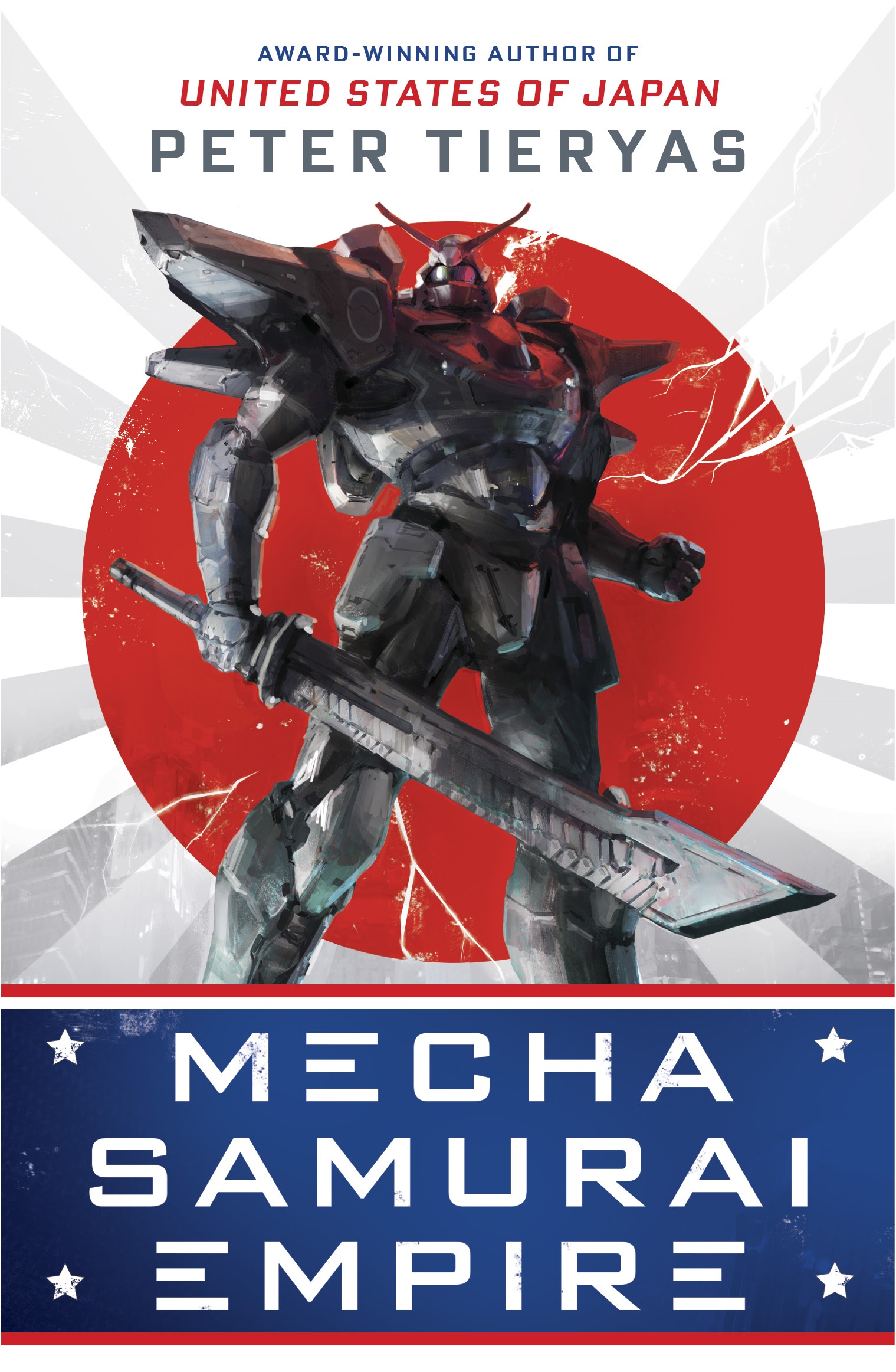Mecha Samurai Empire by Peter Tieryas Review
Tieryas channels Heinlen and Dick in this new alternate history novel set in the world of The United States of Japan.
Mecha Samurai Empire by Peter Tieryas is one of Den of Geek’s Most Anticipated Science Fiction Reads of September 2018.
A friend of mine in the army once shamed me for not having read Robert A. Heinlein’s Starship Troopers. To him, the questions posed by the speculative fiction novel—of citizenship and soldiery, of what role the defenders play in larger society, and philosophies about the nature of war and humanity—are ones everyone should have a chance to explore.
I thought a lot about him while reading Mecha Samurai Empire because it resonated with me in the same way that Heinlein’s novel did all those years ago: In Tieryas’s excellent second novel in the United States of Japanuniverse, Makoto “Mac” Fujimoto tackles all of those questions, sometimes with earnestness, sometimes naivety, and sometimes with rage.
I don’t think the questions themselves are ever really answered—can questions about the nature of war and humanity ever really be answered satisfactorily?—but Mac’s insight into them, and the world in which he’s asking them, are sure to stay with me. If Tieryas’s first novel, United States of Japan, was a successor to Philip K. Dick’s The Man in the High Castle, Mecha Samurai Empire is the heir of Heinlein’s Starship Troopers.
And also, there are really freaking cool mecha battles.
In the universe of Tieryas’s United States of Japan and Mecha Samurai Empire (both of which stand alone, but which share a few recurring characters), Japan and Germany won World War II, and divided the Americas between them. On the west, the United States of Japan prospers, feeling like a weird and delightful hybrid of Japanese and American culture that might have developed with 50 years of cultural merging. In the east are the German Americas, where non-Aryans are second class citizens (or worse).
There’s an uneasy truce between the Japanese Empire and the German Reich; they’ve fought battles before, where Japanese mecha met German biomechs in combat, the mecha typically ending up on top, but the border staying stable along the Quiet Zone that runs through Texas. Tieryas introduces the setting details as the story moves forward, never falling prey to an info-dump, but always making the setting feel like a natural part of the story, with characters who can hardly imagine that history might have gone another way.

The story begins with Mac in his senior year of high school, struggling to get his grades up, but also training with portical (video) games at the local arcade, sure that mastering the latest sims will give him the edge in the mecha examination that will make or break his chances of ever realizing his dream of becoming a mecha pilot.
Mac’s parents both worked on mecha, and both were killed in The Battle of San Diego, leaving him an orphan attended to—not well—by the state, in the care of a foster family that hates him, and sent him to boarding school at the earliest opportunity.
Mac’s best friends are Hideki, who wants to be a game designer, and Griselda, an exchange student from Germany, with whom he shares a very subtle, budding romance. Mac is overweight and an uninspired student; his desire to one day join the mecha corps is greeted with derision by a Lieutenant of the corps who is recruiting students, and who later serves as one of the mecha test proctors where he takes out his grudge on Mac’s perceived disrespect for the corps on Mac himself.
Hideki, sure that both he and Mac, with their test scores and without influence in the world, are bound to fail at their dreams, encourages Mac to cheat. He can get them the answers in advance. Mac refuses, but Hideki’s plan sets into motion one of the most important events in Mac’s life—one that will leave him floundering, wondering about the sacrifices the Empire will make to keep the United States of Japan safe, even if it means sacrificing one of its citizens.
It also leads to Mac’s first experience serving on a mech: he accidentally becomes a hero against an uprising of American terrorists in Los Angeles, which gives him a different opportunity than the one he always wanted: unable to get into the university of his dreams, he becomes a member of the civilian defense force that also pilots mecha.
From there, another tragedy gives him the opportunity to fulfil his life goals—but also the questions of how many loyal citizens and soldiers are sacrificed by poor leadership, or military leaders whose goals are only based on the big picture, not on those individuals who suffer from their choices.
Despite the penchant for philosophical exploration, Mac isn’t a truly deep thinker: he willingly accepts a lot of things at face value, and struggles with how people could view his friendship with a German as potentially treasonous. Tieryas keeps hidden the loyalties of Mac’s peers, and though most are stalwart companions, there’s reason to doubt where others’ loyalties lie.
The characters from the USJ have Japanese names, but many are of different heritages, and the number of strong female characters in the cast surrounding Mac is a pleasant departure from earlier military alternate history novels. The mecha battles—whether in simulation, in competition, or facing real combat—are cinematic in their scope, and a delight to read.
Tieryas combines martial arts with giant, smashing, stomping action typical of the MECH/Kaiju genre. The German biomechs are appropriately horrific, and the sacrifices made by those pilots is equally gruesome, its almost throwaway nature in the novel a testament to how the German Americas and the Reich treat their soldiers even more expendably than the Empire.
It’s also worth mentioning that the descriptions of food are among the best I’ve read, outside of Redwall (Brian Jacques) and the Vlad Taltos series (Steven Brust). I have never had a book inspire me to crave Japanese take-out quite as much as this one did.
The takeaway? I missed United States of Japan when it came out, and it’s now at the top of my to-be-read pile. Spending time in this setting, even with the looming threat of war and the horror of the biomechs, is a delight, and Mac is a sympathetic narrator surrounded by complex characters with their own unique takes on why the world is the way it is. Add big robot vs. monster action, and this is a sure winner.
Mecha Samurai Empire by Peter Tieryas is now available to buy via Amazon or your local independent bookstore.
Alana Joli Abbott writes about books for Den of Geek. Read more of her work here.
